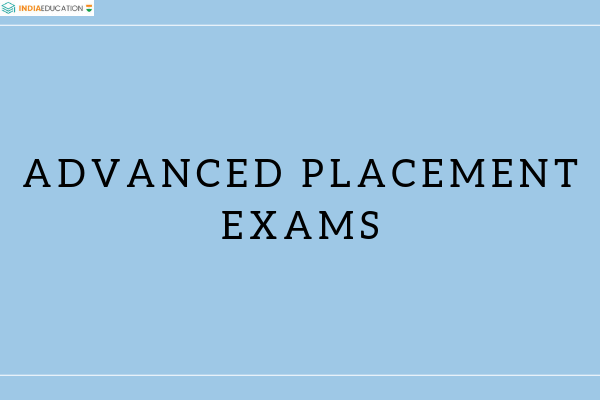

Advanced Placement (AP) Exams
Naief Khatri

The Advanced Placement exams, also known as AP exams, are created by the College Board. The College Board is a mission-driven non-profit organization and bridges the link between students and success in college. It was founded in 1990, and was created to expand and enable access to higher education. Today, more than 6,000 leading global educational institutions are members of College Board for offering AP exams in India.
What is the AP exam?
The Advanced Placement Program (AP) enables students to pursue courses of university-level while still in high school. Indian students who are planning on pursuing their undergraduate studies in the Australia, Canada, Singapore, U.K., and U.S., and other countries are eligible to receive university credit, or even consideration during the admission process for the AP Exam scores.
Taking the AP course helps the student stand out during the process of college admissions, by showing admissions officers that the student underwent a rigorous curriculum to attain college credit.
Eligibility criteria
The AP Registration for College Board’s Advanced Placement Program is open for all eligible students, including those who are currently not enrolled in the program. You must be below 21 years of age at the time of the exam, and you must bring your original and valid passport to the test center on the day of the exam.
The program is flexible, and you can decide how many exams you want to take in a particular year. The ideal time to enroll for the course and take the AP exam in India is in 11th or 12th grade, but some students take the exams after 10th grade as well. In the case of a one-year gap between high school and university, or in case of military service, or any other special circumstance, exceptions are made and you will be able to take the exam even if you are over the maximum age limit of 21 years.
Exam pattern/ format
The Advanced Placement Program offers 34 courses and exams across mathematics, sciences, social sciences, arts and world language, but individual schools and test centers determine the subjects to be offered. In India, 22 different AP exam courses are available for you to choose from.
The exams’ duration of the AP exam in India can vary from 90 minutes to 200 minutes. It depends on the subject. The exam consists of multiple-choice questions (MCQs) and a free-response section.
The examination is offered in paper and pencil format.
The subjects offered are:
- World Languages and Culture
- Chinese Language and Culture
- French Language and Culture
- German Language and Culture
- Italian Language and Culture
- Japanese Language and Culture
- Latin
- Spanish Language and Culture
- Spanish Literature and Culture
- World Languages and Culture
- Arts
- 2-D Arts and Design
- 3-D Arts and Design
- Art History
- Drawing
- Music Therapy
- Arts
- History and Social Sciences
- Comparative Government and Politics
- European History
- Human Geography
- Macroeconomics
- Microeconomics
- Psychology
- United States Government and Politics
- United States History
- World History
- History and Social Sciences
- Sciences
- Biology
- Chemistry
- Environmental Science
- Physics 1 (Algebra based)
- Physics 2 (Algebra based)
- Physics C: Electricity and Magnetism
- Physics C: Mechanics
- Sciences
- English
- English Language and Composition
- English Literature and Composition
- English
- Mathematics and Computer Science
- Calculus AB
- Calculus BC
- Computer Science A
- Computer Science Principles
- Statistics
- Mathematics and Computer Science
Scoring method
Students with an AP score of three or higher in the five-point Advanced Placement score system are said to be successful, and have the opportunity to apply for the AP level college courses. Research shows that students who achieve a score higher than three tend to experience easier and better academic success in college, in comparison to their peers
Exam schedule
- The AP Exam is conducted in the month of May.
- The AP registration for the is yet to be announced.
- The deadline for registration for the Advanced Placement Program is yet to be announced.
- The Advanced Placement Program examinations will be held between 2nd May 2020 to 6th May 2022 and 9th May to 13th May 2022. The late testing exam will begin on 17th May 2022 and is likely to end on 19th May 2022.
Week 1 schedule of Advanced Placement Exam 2022 –
Week 1 | Morning 8 a.m. Local Time | Afternoon 12 p.m. Local Time |
Monday, May 2, 2022 | Japanese Language and Culture United States Government and Politics | Chemistry Spanish Literature and Culture |
Tuesday, May 3, 2022 | Environmental Science | Psychology |
Wednesday, May 4, 2022 | English Literature and Composition | Comparative Government and Politics Computer Science A |
Thursday, May 5, 2022 | Human Geography Macroeconomics | Seminar Statistics |
Week 2 schedule of Advance Placement Exam 2022 –
Week 2 | Morning 8 a.m. Local Time | Afternoon 12 p.m. Local Time | Afternoon 2 p.m. Local Time |
Monday, May 9, 2022 | Calculus AB Calculus BC | Computer Science Principles Italian Language and Culture |
|
Tuesday, May 10, 2022 | English Language and Composition | Physics C: Mechanics | Physics C: Electricity and Magnetism |
Wednesday, May 11, 2022 | Chinese Language and Culture Spanish Language and Culture | Biology |
|
Thursday, May 12, 2022 | French Language and Culture World History: Modern | Physics 1: Algebra-Based |
|
Friday, May 13, 2022 | German Language and Culture Music Theory | Latin Physics 2: Algebra Based |
|
Late testing schedule of AP Exam 2022 –
| Dates | Morning 8 A.M Local Time | Afternoon 12 Noon Local Time |
| May 17, 2022 (Tuesday) | Environmental Science | Psychology |
| May 18, 2022 (Wednesday) | Chemistry | Comparative Government and Politics |
| Computer Science A | Computer Science Principles | |
| Physics C: Electricity and Magnetism | English Literature and Composition | |
| Statistics | Macroeconomics | |
| United States History | Spanish Literature and Culture | |
| Chinese Language and Culture | Art History | |
| May 19, 2022 (Thursday) | English Language and Composition | Biology |
| German Language and Culture | French Language and Culture | |
| Human Geography | Japanese Language and Culture | |
| Physics 1: Algebra-Based | Latin | |
| Physics C: Mechanics | ||
| May 20, 2022 (Friday) | Calculus AB | European History |
| Calculus BC | Italian Language and Culture | |
| Microeconomics | Music Theory | |
| Physics 2: Algebra-Based | Seminar | |
| Spanish Language and Culture | United States Government and Politics | |
| World History: Modern |
Exam fee
| AP Exam | Cost |
| Regular AP Exam fee | USD 94 |
| AP Capstone (AP Seminar and AP Research | USD 142 |
| Late fee | USD 40 |
| Late Testing fee | USD 40 |
You can make your payment once you complete the Registration Process. Payments can be made either through Net Banking or via a Credit Card. The list of banks which can be used for payments and credit cards are mentioned below, along with the bank code:
- 10 – ICICI Bank
- 50 – Axis Bank
- 120 – Corporation Bank
- 130 – Yes Bank
- 140 – Karnataka Bank
- 160 – Oriental Bank of Commerce
- 170 – Bank of Rajasthan
- 190 – Union Bank of India
- 180 – South Indian Bank
- 200 – Vijaya Bank
- 230 – Citi Bank
- 240 – Bank of India
- 270 – Federal Bank
- 280 – Allahabad Bank
- 300 – HDFC Bank
- 310 – Bank of Baroda
- 330 – Deutsche Bank
- 340 – Bank of Bahrain and Kuwait
- 350 – J&K Bank
- 370 – Dhanlaxmi Bank
- 420 – Indian Overseas Bank
- 440 – City Union Bank
- 450 – Standard Chartered Bank
- 490 – Indian Bank
- 520 – IDBI Bank
- 530 – State Bank of India
- 540 – Development Credit Bank
- 550 – State Bank of Mysore
- 560 – State Bank of Hyderabad
- 570 – United Bank of India
- 620 – TamilNad Mercantile Bank
- 680 – State Bank of Travancore
Exam Centers
The Advanced Placement examinations are administered at authorized USIEF centers and schools across 11 Indian cities:
- Ahmedabad
- Amritsar
- Bangalore
- Chennai
- Delhi
- Hyderabad
- Jaipur
- Kolkata
- Lucknow
- Mumbai
- Rajkot
Getting the AP Score
The exams will be held between May 4th to May 09th, 2022. Scores will be accessible online in July.
Application procedure
Each test center has its own procedures. It is advised to check the procedure for the center nearest to you, before the deadline for registration.
Test Preparation Tips
The College Board website has many practice questions for every subject, which you can use to practice. It has questions of the Free Response format, and also has scoring guidelines for your perusal.
Make sure you do enough practice, so that you are able to select your answer easily among the choices offered, without spending too much time on that section. The time constraint applies to the Free Response section as well. Ensure that you have enough time to attempt to answer every question.
Write down every step used to work out the solution as the methodology is important. If you find that your working is incorrect, instead of spending time erasing it, strike it with an ‘X’.
If your answer is partial, do not round them. Store it in your calculator, so that you can directly use the number in further calculations without scope of errors.
While choosing a calculator, a graphing calculator is advised, as it helps for questions with graph functions, numerical derivatives, computation of definite integrals, and to solve equations.
Contact
For more information, contact College Board International.
The College Board,
45 Columbus Avenue,
New York, NY 10023-6992
United States of America
Tel: +1-212-373-8738
Email: [email protected]
Fax: +1-646-417-7350
The College Board,
1233 20th Street NW,
Suite 600
Washington, DC 20036-2375
Tel: +1-202-741-4700
Fax: +1-202-741-4745
You can also contact USIEF.
United States-India Educational Foundation (USIEF),
12 Hailey Road,
New Delhi, 110-001
India
Tel: +91-114-209-0909 / +91-112-332-8944
Email: [email protected]
Fax: +91-112-332-9718

About Elizabeth Joseph
Elizabeth Joseph has a Bachelors degree in Computer Science and Engineering and dabbles in poetry and article writing.
Latest News
People Reading Now

CBSE Compartment Result 2023 OUT: Click For Direct Link



CSAB 2023: Special Round Registration Begins Today


